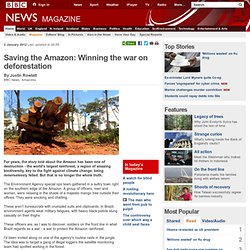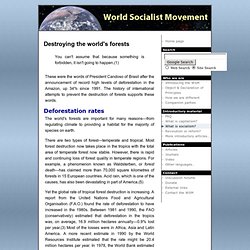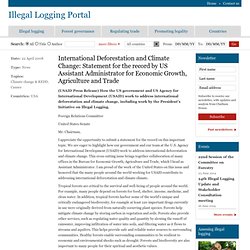

Saving the Amazon: Winning the war on deforestation. 2 January 2012Last updated at 00:55 By Justin Rowlatt BBC News, Amazonia For years, the story told about the Amazon has been one of destruction - the world's largest rainforest, a region of amazing biodiversity, key to the fight against climate change, being remorselessly felled.

But that is no longer the whole truth. The Environment Agency special ops team gathered in a sultry town right on the southern edge of the Amazon. A group of officers, men and women, were relaxing in the shade of a majestic mango tree outside their offices. They were smoking and chatting. These aren't bureaucrats with crumpled suits and clipboards. These officers are, as I was to discover, soldiers on the front line in what Brazil regards as a war - a war to protect the Amazon rainforest. I'd been invited along on one of the agency's routine raids in the jungle. On a map pinned to the wall, three commanders were working out strategies and logistics, just like a military operation. Nothing serious? Hope "Para ai! Deforestation – World Socialist Movement. You can't assume that because something is forbidden, it isn't going to happen.(1) These were the words of President Candoso of Brasil after the announcement of record high levels of deforestation in the Amazon, up 34% since 1991.

The history of international attempts to prevent the destruction of forests supports these words. Deforestation rates The world's forests are important for many reasons—from regulating climate to providing a habitat for the majority of species on earth. There are two types of forest—temperate and tropical. Yet the global rate of tropical forest destruction is increasing. Only a very small proportion of the world's tropical forests are managed sustainably, so as to ensure that trees are not felled at a rate exceeding the capacity of the forest to grow back.
Causes It is clear from the very fact that deforestation has taken place on such a huge scale that ecological sustainability has not been given priority. Attempted Solutions: International Agreements However, International Deforestation and Climate Change: Statement for the record by US Assistant Administrator for Economic Growth, Agriculture and Trade. Foreign Relations Committee United States Senate Mr.

Chairman, I appreciate the opportunity to submit a statement for the record on this important topic. We are eager to highlight how our government and our team at the U.S. Tropical forests are critical to the survival and well-being of people around the world. Unfortunately, tropical forests face a number of threats, including conversion to agriculture, illegal logging, unsustainable extraction of timber and other forest resources, climate change, pollution, and policies that subsidize forest conversion to other uses. To address these concerns and to ensure that forests and biodiversity continue to play an important role in sustainable development, USAID supports programs around the globe that aim to improve the conservation and sustainable management of forests and biodiversity. Forest Bump - By Charles Kenny.
Fewer jobs, dwindling savings, piles of public debt -- there's not much reason to be thankful for the global recession.

But one small silver lining is that it has slowed the rate at which we're turning the atmosphere into an over-amped electric blanket. There are two things at work here: First, less growth slows the demand for energy. During a recession, people make less, drive less, and even turn off lights more to save a couple dollars on the utility bill. That's the big factor behind greenhouse gas emissions in the United States having fallen 6 percent between 2008 and 2009, according to the Environmental Protection Agency. The second reason environmentalists can feel good about a recession is that lower demand for everything -- including wood and agricultural products -- reduces the incentive to chop down trees.
Tropical forests are home to about half of all species on Earth. Wheeler's analysis does suggest one potentially more straightforward approach. Deforestation Facts, Deforestation Information, Effects of Deforestation. Modern-Day Plague Deforestation is clearing Earth's forests on a massive scale, often resulting in damage to the quality of the land.

Forests still cover about 30 percent of the world’s land area, but swaths the size of Panama are lost each and every year. The world’s rain forests could completely vanish in a hundred years at the current rate of deforestation. Forests are cut down for many reasons, but most of them are related to money or to people’s need to provide for their families.The biggest driver of deforestation is agriculture. Farmers cut forests to provide more room for planting crops or grazing livestock. Logging operations, which provide the world’s wood and paper products, also cut countless trees each year. Not all deforestation is intentional. Deforestation has many negative effects on the environment. Deforestation also drives climate change. Trees also play a critical role in absorbing the greenhouse gases that fuel global warming.